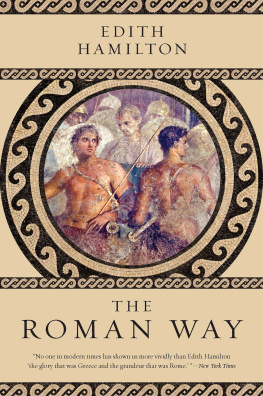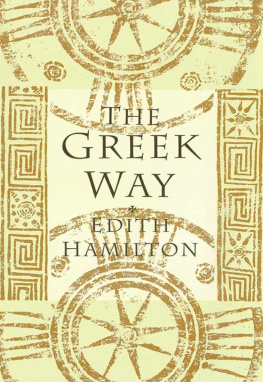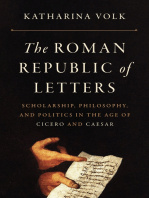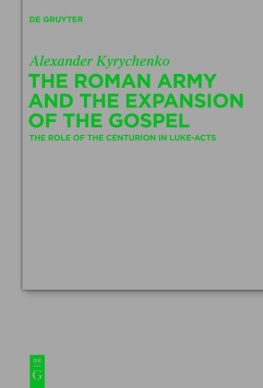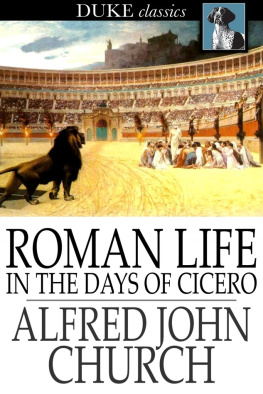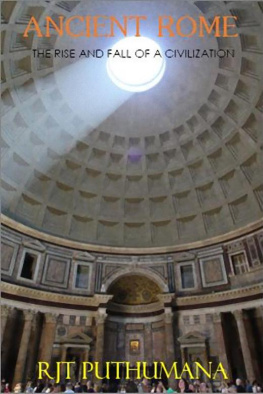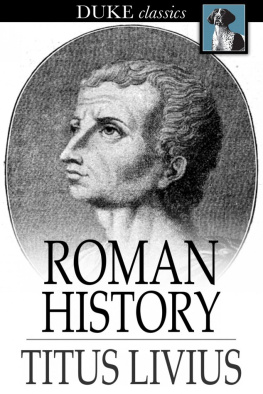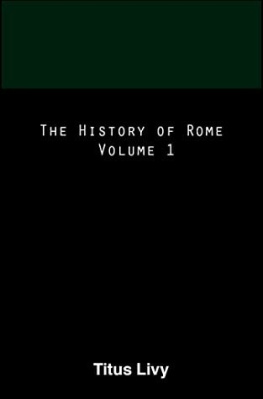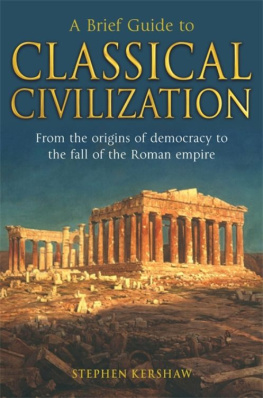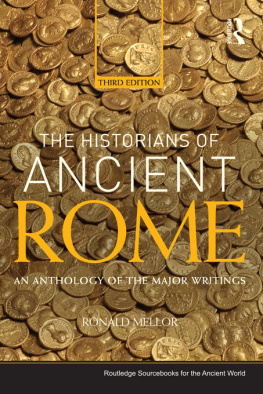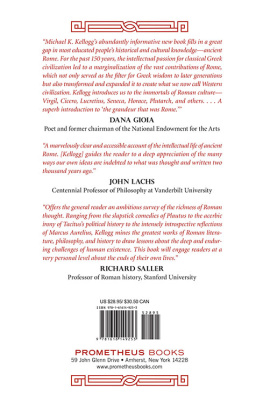
The
ROMAN WAY
Edith Hamilton

TO
D F R
nostrorum sermonum
candide iudex
CONTENTS
If a personal confession may be allowed, although I have read Latin ever since my father, who knew nothing about methods for softening the rigors of study, started me at the age of seven on Six Weeks Preparation for Caesar , I have read it, except during the brief intermission of college, for my own pleasure merely, exactly as I would read French or German. I open a volume of Cicero or Horace or Virgil purely for the enjoyment of what they write, not in the slightest degree because they write in Latin or because they are essential to a knowledge of Roman history. What the Romans did has always interested me much less than what they were, and what the historians have said they were is beyond all comparison less interesting to me than what they themselves said.
It was inevitable, therefore, that when I came to think about the outline of The Roman Way , I should see it entirely as it was marked out by the Roman writers. I have considered them alone in writing this book. It is in no sense a history of Rome, but an attempt to show what the Romans were as they appear in their great authors, to set forth the combination of qualities they themselves prove are peculiarly Roman, distinguishing them from the rest of antiquity. A peoples literature is the great text-book for real knowledge of them. The writings of the day show the quality of the people as no historical reconstruction can. When we read Anthony Trollope or W. S. Gilbert we get an incomparably better view of what mid-Victorian England was like than any given by the historians. They will always be our best text-books for an understanding of the force back of those years of unparalleled prosperity for the favored fewthe character and the outlook of the upper-class Englishman.
That is the kind of text-book I have depended upon exclusively. For each period I have taken only the accounts given by contemporary writers. The contents of the book are the result of a selection based not upon personal preferences but upon how much a writer shows of the life and character of the men of his own times. Plautus and Terence from this point of view are of the greatest importance, as they not only paint the very first picture we have of Rome, but do so in great detail. The century in between Terence and Cicero is, of course, passed over, since none of the writings have survived. Ciceros Rome is taken up at greater length than any other period because his letters are the best source of information we possess for any age, not of Rome only, but of all antiquity.
The force Rome had to mould her people is evident on every page of her literature. All her men of letters were Romans first, individual artists only second. Different, of course, from each other, as Cicero, for instance, is different from Tacitus, or Horace from Juvenal, their differences are yet superficial compared to their fundamental resemblances. During the four centuries which saw the beginning and end of Latin Literature as it has come down to us, every writer shows the main outlines of the Roman way.
The
ROMAN WAY
When the curtain rings up for the stupendous drama which we know as Ancient Rome, it is raised surprisingly on two comic writers. They are the first to make their appearance on that mighty stage. The oldest piece of Roman literature we have is a collection of comedies. Only two earlier writers are known to us and of their work a few lines is all that is left. Not only Latin literature, but our own direct knowledge of Rome, have their source in comedy, and that not of a rude, popular sort, but sophisticated, a true comedy of manners. The fact, seldom meditated upon, is a little disturbing. We all have our idea of the Romans, implanted by education, by many books: an indomitable people, stern and steadfast and serious beyond all others. It is disconcerting that the fountainhead of our knowledge should be the very reverse of all this. Our notion of the proper beginning for the literature of the mistress of the world would be something martial and stirring, old ballads of valiant men and warlike deeds with spirited bards to sing them, culminating in a great epic, a Latin Iliad . But it actually begins as far away from that as the wide realm of letters allows, in a series of comedies which are avowedly founded upon the popular Greek comedy of the day.
No other great national literature goes back to an origin borrowed in all respects. In Greece the development was the natural one, from songs and stories handed down by word of mouth and added to through unknown ages. There was a spontaneous desire in the peoplethe farmers, shepherds, fighting menfor imaginative expression, which ultimately took literary shape and was preserved. With the Romans it was just the other way about. The literary shape came first, across the sea, from Greece. The desire for expression was secondary, following upon the discovery of an appropriate form ready-made to hand. The fact is full of significance for the Roman mentality.
Roman literature appears suddenly, during the third century B.C ., in the generation after the First Punic War, and not only comedy, but everything else as well is modelled upon the Greek. There is hardly even a suggestion anywhere of a native product supplanted by the imported. We find, indeed, a metre never met with elsewhere which the first translator from the Greek used, and a few references in later writers to old ballads heard in boyhood, but that is all. Whether the truth is that the Roman shepherds and farmers, with the strong practical bent that later marked them, had little inclination to spend valuable time in singing songs and making up stories, or whether the literary men when they finally appeared despised the popular productions as beneath the notice of writers who were out to bring culture to Rome and bring it quick, the fact is equally illuminating. A sense for poetry was not strong in the Roman people. Their natural genius did not urge them on to artistic expression. Rome was said to have been founded in the year 753 B.C ., and the earliest piece of literature we know about is a translation of the Odyssey made at the end of the First Punic War, some five hundred years later. For all these centuries it would seem that the Romans felt little impulsion to express in any form what the world was showing them and life bringing them. Later Roman critics speak of a native comedy, dramatic improvisations at festivals, but there is no warrant for supposing that it was ever written down and it is certain that it had no direct literary descendants.
For us, Roman literature begins with Plautus, writer of comedies after the Greek fashion, and what he shows us of Roman life is the first glimpse we have of Rome. It is a brief glimpse. The curtain raised for him and his successor, Terence, is quickly lowered. When it is raised again we are looking at the age of Cicero. With the exception of a treatise on agriculture, curiously the one surviving work of the indomitable old censor of morals, Cato, we have only fragmentary bits of the literature in between, no secure basis upon which to reconstruct the city that was already the dominating power in the world. It is true that while Terence, the younger of the two comedians, was producing his plays the Greek Polybius was writing a great history on the rise and growth of the Roman power, of which a considerable part remains, but his concern is with Romes wars and with the Romans as men of war. The only contemporary information given us about the rest of Roman life up to the first century B.C . comes from the work of the two playwrights.
Next page
